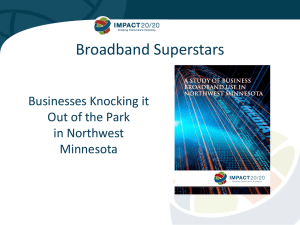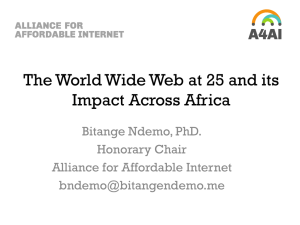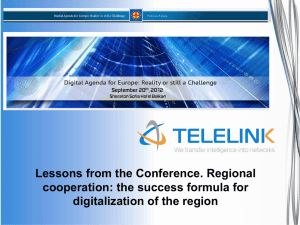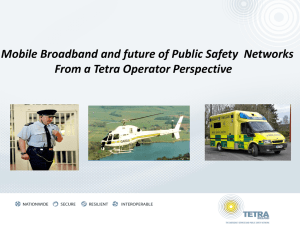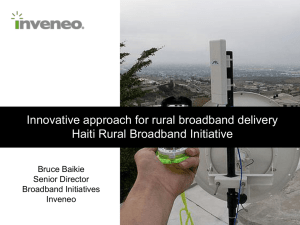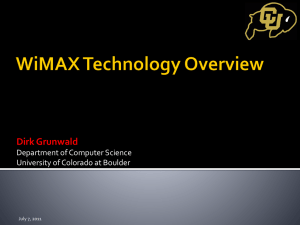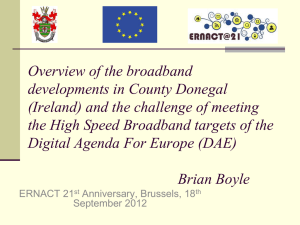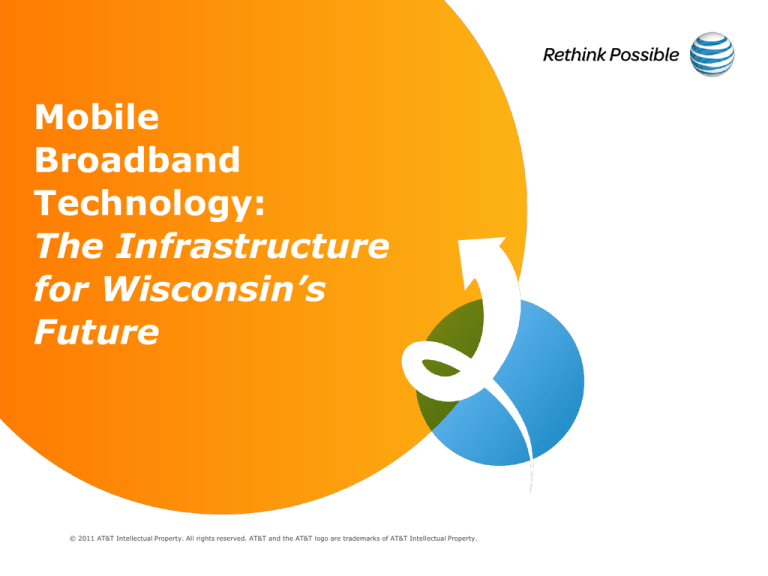
Mobile
Broadband
Technology:
The Infrastructure
for Wisconsin’s
Future
© 2011 AT&T Intellectual Property. All rights reserved. AT&T and the AT&T logo are trademarks of AT&T Intellectual Property.
AT&T and T-Mobile Acquisition
On March 20, 2011, AT&T announced plans to acquire T-Mobile USA from
German-owned Deutsche Telekom, creating a world-class technology
platform in mobile broadband and wireless services in the U.S.
The Acquisition Addresses America’s Spectrum Exhaust Challenges
Driven by explosive growth for mobile broadband, the U.S. faces spectrum constraints
• Spectrum is the range of airwave frequencies that enable everything from
broadcast television to cell phones to mobile broadband, and even baby monitors.
• The growth of airwave-dependent devices like smartphones and tablet computers
has been unprecedented. According the FCC’s staff “mobile data demand will
exceed available capacity by 2013.”
• AT&T’s mobile data traffic grew 8000% over the past four years, and by 2015 is
expected to be 8-10 times what it was in 2010.
A Fast, Efficient and Certain Solution
The combination of T-Mobile’s and AT&T’s technologically compatible networks offers a
fast, efficient and certain solution to meet consumer demand for mobile
broadband, improve service, and help drive growth and investment in U.S. mobile
broadband networks.
2
"I believe that the
biggest threat to
the future of
mobile in America
is the looming
spectrum crisis."
Julius Genachowski,
FCC Chairman
Mobile Broadband Technology: The infrastructure for Wisconsin’s future
The Acquisition Will Create
Significant Consumer Benefits
1. Expanded 4G LTE to over 97% of U.S. population
• 55 million more people will have access to AT&T’s LTE service – more
than the combined populations of New York and Texas
• 4G means that mobile devices can be as fast or faster than wired
laptops
• Greater access, lower latency, and faster wireless broadband connection
speeds to meet growing consumer demand for mobile broadband
2. Improved voice and data service
• Increased spectrum efficiencies, combined with additional network
capacity and output will deliver better voice quality, better coverage and
faster data speeds
3. An additional $8 billion of private infrastructure investment
• New jobs will be created when the planned network expansion gets
underway
4. Investment and better mobile broadband access in rural
communities
• Billions invested in rural America that can improve economic
competitiveness and stimulate additional investment and job creation
5. Access for 34 million T-Mobile customers to nationwide, robust 4G
LTE
• T-Mobile USA does not have a clear path to delivering 4G LTE
6. America’s largest wireless unionized workforce
• AT&T is the only major U.S. wireless company with a union workforce,
offering leading wages, benefits, training and development for
employees.
3
“The real winner in this
merger is the consumer.”
Zack Christenson
American Consumer
Institute
“The parties have a
surprisingly strong
argument that their
merger would allow
better service, lower
costs and more efficient
use of existing spectrum
without hurting
consumers.”
Holman Jenkins, Jr.
Wall Street Journal
Mobile Broadband Technology: The infrastructure for Wisconsin’s future
Expanded 4G LTE to Cover Over 97%
of U.S. Population
Current Plan
With Merger
To present a conservative view of estimated coverage when compared to post-merger maps and to address potential deployment changes as plans are
operationalized, map is based on assumptions that maximize potential coverage areas and thus depicts areas outside current pre-merger build plan. Additional
information may alter estimated coverage. Actual coverage provided will vary as specific network design and construction takes place.
Maps depicts estimated coverage based on current information and modeling assumptions as of April 21, 2011. Additional information obtained post-closing
may alter estimated coverage. Actual coverage provided may differ.
4
Mobile Broadband Technology: The infrastructure for Wisconsin’s future
A 4G Nation:
Innovation, Economic Growth & Jobs
• More than $8 Billion in infrastructure spending by
AT&T over seven years, enabling the economy to
innovate and grow.
– One job in the communications industry is associated
with 2.52 indirect jobs
Phoenix Center Policy Bulletin No. 25, October 2010
• Accelerated broadband deployment that creates jobs
across all industries.
– Every one percentage-point increase in broadband
penetration is accompanied by an increase in
employment of 0.2 percent to 0.3 percent per year
Brookings Institution, Issues in Economic Policy, July 2007
• 4G LTE network in more areas can spur additional
growth and hiring from small businesses that rely on
broadband to compete globally and levels the playing
field for innovation
– For example: By 2013, over 20 billion downloads
from mobile app stores are expected to drive a $30
billion industry — an industry that didn’t exist in 2008
5
Mobile Broadband Technology: The infrastructure for Wisconsin’s future
AT&T and T-Mobile Acquisition
As a result of the transaction AT&T has committed it will
deploy LTE to more than 97% of the U.S. population.
For Wisconsin, we estimate this means:
• More than 1.75 million additional people covered in
the state
• More than 90% of the state’s population covered by
LTE footprint
• More than 30,000 additional square miles served
• More than 400% increase in geographic area of LTE
footprint in the state
6
Mobile Broadband Technology: The infrastructure for Wisconsin’s future
AT&T and T-Mobile Acquisition
How You
Can Help
7
Mobile Broadband Technology: The infrastructure for Wisconsin’s future
The U.S. Wireless Landscape
is Fiercely Competitive
According to FCC findings, 90 percent of the U.S.
population lived in census blocks covered by five or more
facilities-based wireless providers in 2010
Source: FCC Wireless Competition Report (2008-2011)
8
Historically, during periods when
carriers combined to achieve
efficiencies, U.S. wireless prices fell
9
Mobile Broadband Technology: The infrastructure for Wisconsin’s future


